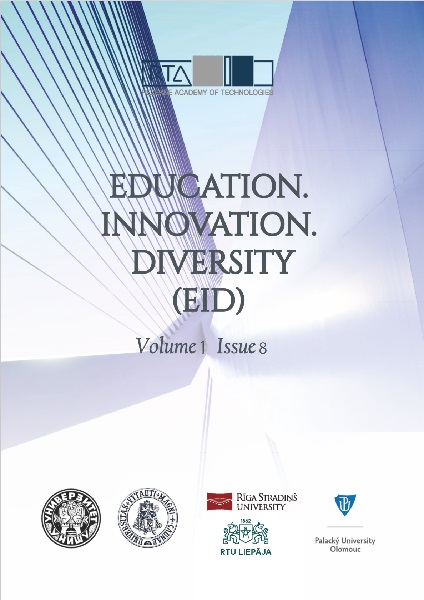TEACHER’S PEDAGOGICAL SELF-EFFICACY FOR ENSURING THE QUALITY OF EDUCATION
DOI:
https://doi.org/10.17770/eid2024.1.7933Keywords:
confidence, teacher, inclusive education, motivation, pedagogical self-efficacy, positive social-emotional school environmentAbstract
Nowadays we are living with conscious awareness of change around us. Therefore, openness to change and problem-solving skills become essential transversal competences for everyone. However, teachers often perceive changes in their work environment as problems rather than challenge and opportunity to improve the quality of education. Thus, persistence and creativity in solving problems becomes an important indicator of a teacher’s self-efficacy. To promote the quality of education, teachers’ pedagogical self-efficacy becomes important, which significantly affects the learning achievements of students. Pedagogical self-efficacy consists of the teacher’s confidence in abilities regarding lesson planning, student assessment, choice of teaching strategies, etc. One of the basic principles of educational progress is inclusive education and acceptance of diversity. Creating a positive school psycho-emotional environment and creative pedagogical strategies also become important. The literature review is used as a research method to summarize the theoretical foundation of the topic. Theories provide a comprehensive explanation of a particular aspect of nature of the phenomenon of self-efficacy supported by evidence. The aim of the publication is to analyse the aspects of teacher’s pedagogical self-efficacy focusing on the way it affects the quality of education, which also includes the promotion of students’ internal motivation and preventing behavioural problems.
References
Avramidis, E., & Norwich, B. (2002). Teachers' attitudes towards integration / inclusion: a review of the literature. European Journal of Special Needs Education, Volume 12, 129.-147. DOI: https://doi.org/10.1080/08856250210129056
Bandura, A. (1997). Self – efficacy, The Exercise of Control. New-York: W. H. Freeman and Company.
Beizītere, I., Grumolte-Lerhe, I., Ziemane, I. (2020). Pētījumi. Iekļaujošā izglītība bērniem ar speciālām vajadzībām Latvijā. Retrieved from:
https://www.saeima.lv/petijumi/Ieklaujosa_izglitiba_berniem_spec_vajadzibam_Latvija.pdf
Bray-Clark, N., & Bates, R. (2003). Self-Efficacy Beliefs and Teacher Effectiveness: Implications for Professional Development. The Professional Educator, Volume XXVI,. 13-22. Retrieved from https://files.eric.ed.gov/fulltext/EJ842387.pdf
Čakāne, L. (2018). Formatīvās vērtēšanas lomas pastiprināšanās, īstenojot mācīšanos iedziļinoties. In D. Namsone (Ed.), Mācīšanās lietpratībai (pp. 131.-145.). Rīga: LU Akadēmiskais apgāds. doi:https://doi.org/10.22364/ml.2018.5
Damberga, I. (2015). Mācīšanās. In K. Mārtinsone, & A. Miltuze (Eds.), Psiholoģija 1 (pp. 258.-287.). Rīga: Apgāds Zvaigzne ABC.
Desombre, C., Delaval, M., & Jury, M. (2021). Influence of Social Support on Teachers' Attitudes Toward Inclusive Education. Frontiers in Psychology, Volume 12. DOI: https://doi.org/10.3389/fpsyg.2021.736535
Dignath, C., Rimm-Kaufman, S., van Ewijk, R., Kunter M. (2022). Teachers’ Beliefs About Inclusive Education and Insights on What Contributes to Those Beliefs: a Meta-analytical Study. Educational Psychology Review, Volume 34, 2609–2660. DOI: https://doi.org/10.1007/s10648-022-09695-0
Dörnyei, Z. (2001). Teaching and Researching Motivation. Essex: Pearson Education Limited.
Fischer, S. J., & Bilz, L. (2021). Teachers’ Self-efficacy in Preventing and Intervening in School Bullying: a Systematic Review. International Journal of Bullying Prevention, Volume 3, 196-212. DOI: https://doi.org/10.1007/s42380-020-00079-y
Hattie, J. (2009). Visible Learning A synthesis of over 800 meta-analyses relating to achievement. London and New York: Routlege.
Heyder, A., Südkamp, A., & Steinmayr, R. (2020). How are teachers' attitudes toward inclusion related to the social-emotional school experiences of students with and without special educational needs? Learning and Individual Differences, Volume 77. DOI: https://doi.org/10.1016/j.lindif.2019.101776
Hoffmann, L., Närhi, V., Savolainen, H., & Schwab, S. (2021). Classroom behavioural climate in inclusive education -a study on secondary students' perceptions. Journal of Research in Special Educational Needs, Volume 22. DOI: https://doi.org/10.1111/1471-3802.12529 .
Izglītības un zinātnes ministrija. (2021). Izglītības attīstības pamatnostādnes 2021.-2027. gadam "Nākotnes prasmes nākotnes sabiedrībai". Retrieved from https://likumi.lv/ta/id/324332-par-izglitibas-attistibas-pamatnostadnem-20212027-gadam
Kangro A.; Kiseļova R. (2019). OESD - PISA. Izglītības un zinātnes ministrija. Retrieved from https://www.izm.gov.lv/sites/izm/files/media_file/latvija_oecd_starptautiskaja_skolenu_novertesanas_programma_2018.pdf
Laiveniece, S. (2023). Pedagogi konferencē diskutē par vecāku līdzatbildību. Retrieved from https://www.liepajniekiem.lv/zinas/sabiedriba/pedagogi-konference-diskute-par-vecaku-lidzatbildibu/
Lane, J., Lane, A., & Kyprianou, A. (2004). Self-Efficacy, Self-Esteem and Their Impact on Academic Performance. Social behavior and personality, 32(3), 247-256. DOI: https://doi.org/10.2224/sbp.2004.32.3.247
Martinsone, B. (2024). Mācīšanās sākas ar attiecību veidošanu. Skolas Vārds, 2., pp. 12.-15. Retrieved from https://e-biblioteka.liepu.lv/magazine/skolasvards/all
Namsone, D., & Čakāne, I. (2023). Kā iegūt pierādījumus par mācīšanu un mācīšanos stundā – ceļā uz mācīšanos iedziļinoties. In D. Namsone, Datu zinātība skolai (pp. 102.-124). Rīga: LU Akadēmiskais apgāds. DOI: https://doi.org/10.22364/dzs.23.06
Namsone, D., Čakāne, L., Volkinšteine, J., & Butkēviča, A. (2018). Kā novērtēt skolotāju sniegumu un mērķtiecīgi pilnveidot skolotāju prasmes. In D. Namsone (Ed.), Mācīšanās lietpratībai (pp. 158.-188). Rīga: LU Akadēmiskais apgāds. DOI: https://doi.org/10.22364/ml.2018.7
Nīmante, D. (2021). Dažādība un iekļaušanās izglītībā. Rīga: Latvijas Universitāte, Pedagoģijas, psiholoģijas un mākslas fakultāte.
OESD. (2019). PISA 2018 Results. What School Life Means for Students’ Lives, Volume III. PISA, OECD Publishing, Paris. DOI : https://doi.org/10.1787/acd78851-en
Oliņa, Z. (2020). Daudzveidība kā norma – skolā katram bērnam. Domāt.Darīt.Zināt. Nr.12, pp. 4.-5. Retrieved from Skola2030: https://skola2030.lv/admin/filemanager/files/2/NL_12.pdf
Perera, H. N., Calkins, C., & Part, R. (2019). Teacher self-efficacy profiles: Determinants, outcomes, and generalizability across teaching level. Contemporary Educational Psychology, 58(3), 186-203. DOI: https://doi.org/10.1016/j.cedpsych.2019.02.006
Poulou, M. S., Reddy, L. A., & Dudek, C. M. (2018). Relation of teacher self-efficacy and classroom practices: A preliminary investigation. School Psychology International, 40(1), 25-48. DOI: https://doi.org/10.1177/0143034318798045
Reigeluth, C. M. (1993). Principles of Educational Systems Design. Pacific Grove, California: Springer, Berlin, Heidelberg.
Reyes, C., Brackett, M., Rivers, S., White, M., & Salovey, P. (2012). Classroom Emotional Climate, Student Engagement, and Academic Achievement. Journal of Educational Psychology, 104(3), 700.-712. DOI: https://doi.org/10.1037/a0027268
Ryan, R., & Deci, E. (2017). Self-Determination Theory: Basic Psychological Needs in Motivation. New York: The Guilford Press.
Skolotāju izglītība iekļaušanai - Iekļaujošu skolotāju profils. (2012). Retrieved from https://www.european-agency.org/Latvie%C5%A1u%20valoda/publications
Šķietniece, I. & Pļaviņa, V. (n.d.). DISKUSIJA I Iekļaujošā izglītība Latvijā – cik tālu esam? Retrieved from https://www.skolasvards.lv/projects/1/diskusija-i-ieklaujosa-izglitiba-latvija-cik-talu-esam
Trigo-Ibáñez, E., & Santos Díaz, I. (2023). Empirical approach to the gender gap in students’ reading consumption in international contexts. Frontiers in Psychology, Volume 14. DOI: https://doi.org/10.3389/fpsyg.2023.1304890
Tschannen-Moran, M., & Woolfolk Hoy, A. (2001). Teacher Efficacy: Capturing an Elusive Construct. Teaching and Teacher Education, 17(7), 783.-805. DOI: https://doi.org/10.1016/S0742-051X(01)00036-1 .
Vanags, E., & Mazpane, I. (2019). Kā attīstīt pašvadītu mācīšanos? Retrieved from https://www.skola2030.lv/lv/jaunumi/blogs/ka-attistit-pasvaditu-macisanos
Downloads
Published
Issue
Section
License
Copyright (c) 2024 Education. Innovation. Diversity.

This work is licensed under a Creative Commons Attribution 4.0 International License.






